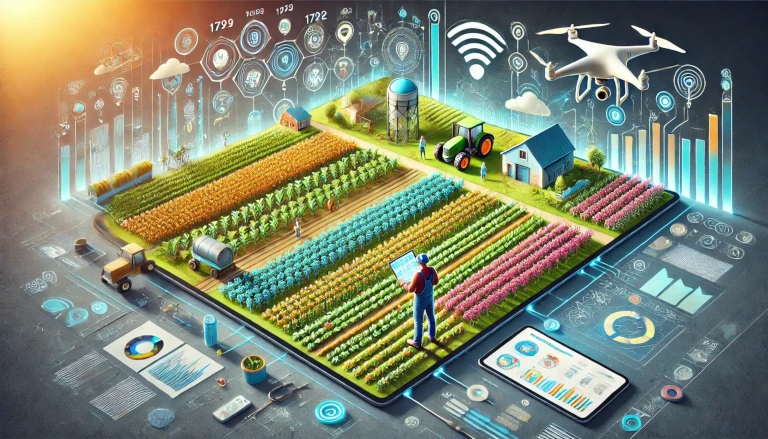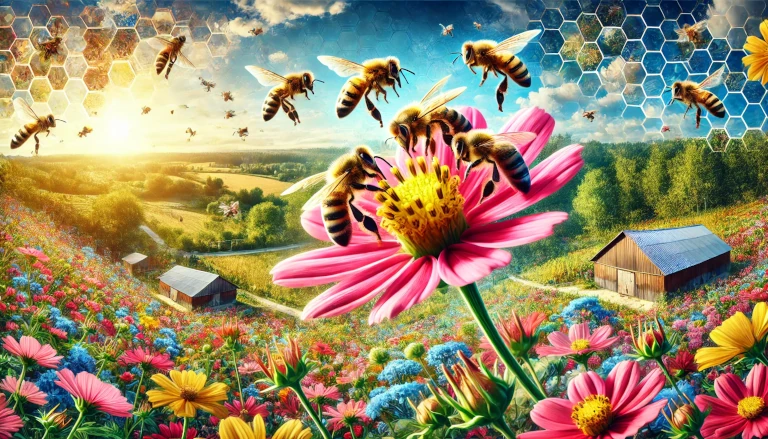As agriculture faces numerous challenges, from climate change to resource scarcity, the role of the Smart Farmer has become increasingly vital. A Smart Farmer leverages modern technology and data-driven strategies to optimize farming practices, conserve resources, and increase crop yields. By adopting innovative tools and methods, Smart Farmers contribute to sustainable agriculture and ensure food security for future generations.
In this blog post, we’ll explore what it means to be a Smart Farmer, the technologies they use, and how they are transforming the agricultural industry. Understanding these advancements can help farmers and communities embrace a more efficient and environmentally friendly approach to farming.
Who is a Smart Farmer? 🌾
A Smart Farmer is someone who integrates technology into their farming operations to improve productivity, efficiency, and sustainability. By utilizing tools such as precision agriculture, IoT devices, drones, and data analytics, Smart Farmers can make informed decisions and manage their farms more effectively. Here are some key characteristics of a Smart Farmer:
1. Tech-Savvy and Innovative 💻
Smart Farmers are open to using technology in their daily operations. They are eager to explore new tools and solutions that enhance their productivity and help them stay competitive.
- Example: A Smart Farmer might use a mobile app to monitor soil moisture levels, ensuring crops receive the right amount of water.
2. Data-Driven Decision Maker 📊
By analyzing data, Smart Farmers can optimize planting schedules, monitor crop health, and predict yields. This data-driven approach allows them to make informed decisions that maximize efficiency and minimize waste.
- Tip: Many Smart Farmers use software that provides real-time data on weather conditions, helping them plan their activities accordingly.
3. Sustainability Focused 🌍
Smart Farmers prioritize sustainable farming practices that reduce environmental impact. By using technology to monitor resources, they can reduce water, pesticide, and fertilizer use, promoting a healthier ecosystem.
- Example: A Smart Farmer may use precision irrigation systems that deliver water directly to the root zone, reducing water wastage.
Technologies Used by Smart Farmers 🌐
Smart Farmers rely on a variety of technologies to optimize their farming operations. Here are some key technologies that are revolutionizing modern agriculture:
1. Precision Agriculture 📈
Precision agriculture involves using technology to monitor and manage crops at a granular level. This includes tools like GPS-guided tractors, soil sensors, and yield monitors that help farmers optimize field inputs.
2. Internet of Things (IoT) in Agriculture 🌾📶
IoT devices, such as soil moisture sensors and weather stations, provide real-time data on various environmental factors. These devices allow Smart Farmers to monitor conditions remotely and make timely adjustments.
- Example: IoT sensors can alert a farmer when soil moisture levels are low, prompting them to activate irrigation systems.
3. Drones and Aerial Imaging 🚁
Drones equipped with cameras and sensors are used to survey fields, monitor crop health, and identify issues such as pest infestations or nutrient deficiencies. This technology helps farmers address problems early, preventing yield loss.
- Tip: Drones can capture images that are analyzed to create detailed maps of fields, identifying areas that need attention.
4. Farm Management Software 💻
Farm management software helps Smart Farmers plan, track, and analyze all aspects of their operations, from planting to harvesting. These platforms often include features for inventory management, budgeting, and crop monitoring.
5. Artificial Intelligence (AI) and Machine Learning 🤖
AI and machine learning algorithms can analyze vast amounts of data to predict crop yields, optimize planting schedules, and detect patterns in crop health. These technologies enable Smart Farmers to make proactive decisions based on data insights.
- Example: AI-powered tools can analyze weather data to recommend the best time to plant crops for optimal growth.
Benefits of Being a Smart Farmer 🌾
Embracing the role of a Smart Farmer offers numerous benefits, both for individual farmers and the environment:
1. Increased Productivity 📈
Technology helps Smart Farmers maximize their yields by optimizing planting, watering, and fertilizing processes. This leads to increased productivity and profitability.
2. Cost Savings 💰
By using data to make informed decisions, Smart Farmers can reduce input costs such as water, seeds, and fertilizers. Precision farming techniques also reduce waste, further lowering expenses.
3. Improved Environmental Impact 🌍
Smart Farmers adopt practices that conserve resources and reduce pollution. Precision agriculture, for example, minimizes pesticide use, protecting local ecosystems and promoting biodiversity.
4. Enhanced Crop Quality and Yield 🌾
Monitoring crop health and optimizing growing conditions allows Smart Farmers to produce higher-quality crops with greater yields, meeting market demands more effectively.
Steps to Become a Smart Farmer 🛠️
If you’re interested in becoming a Smart Farmer, here are some steps to get started:
1. Research and Invest in Technology 📚
Start by researching the technologies that are best suited for your type of farm. Investing in the right tools, such as soil sensors or farm management software, can have a significant impact on your operations.
2. Leverage Data for Decision-Making 📊
Use data to guide your decisions. By analyzing information on soil health, weather patterns, and crop performance, you can optimize your practices and achieve better results.
3. Adopt Sustainable Farming Practices 🌱
Focus on sustainability by using resources efficiently and minimizing waste. Techniques like crop rotation, cover cropping, and precision irrigation can help you reduce your environmental impact.
4. Stay Informed About Emerging Trends 🔍
The field of agriculture is constantly evolving, with new technologies and techniques emerging regularly. Stay informed by attending workshops, joining online forums, and reading about the latest developments in smart farming.
Embracing the Future of Agriculture with Smart Farming 🚜🌍
The rise of the Smart Farmer represents a significant shift towards more efficient, sustainable, and productive agriculture. By adopting technology and embracing data-driven practices, Smart Farmers are able to make a positive impact on their farms and the environment. Whether you’re an experienced farmer or new to the field, becoming a Smart Farmer is an effective way to improve your operations and contribute to a sustainable future in agriculture.
Discover more from Green Ecosystem - Renewable Energy, Agriculture, and Environmental Sustainability
Subscribe to get the latest posts sent to your email.


